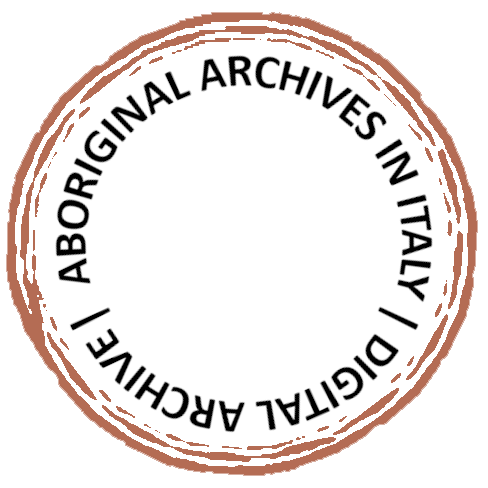Methodologies
Aboriginal Archives in Italy wants to provide a space for centring relationships, multiple narratives and perspectives on the records. Centring on current communities’ voices and aspirations, this research project wants to reflect on “What happens when archives that have been displaced to Italy are redirected to their communities of origin?“. It was inspired by the many First Nations scholars and activists who have exposed the vital importance of the right to know (O’Neal, 2015, among others) and the right to reply (Indigenous Archives Collective, 2021, among others) to their historical archives to achieve concrete social justice and building of a nation based on the recognition of past harm against Indigenous peoples. Under this light, this research project wants to open up a transnational space of dialogue where Aboriginal voices and aspirations are centred, moving from the transactional “physical and nation states-based thinking” often applied to archival records to focus on “plural contingent co-created objects while providing pluralised access to them regardless of where they are located” (Gilliland, 2017). The research design for this study is situated in a transdisciplinary space, grounded in Indigenous Decolonising methodologies, Critical theories and my standpoint of being an Italian woman currently working and living in Gadigal Land.
Values
This study is grounded in the values of Relational Accountability, Reciprocity and Respect, and in recognising the importance of deep listening and learning. Everyone engaging with this project will be required to account for the following values:
- Relational Accountability = committing to learning and deep listening and honouring a relational process based on mutual trust, cooperation, and transparency about the process and the outcomes.
- Reciprocity = committing to give back knowledge and provide a safe space for response and storytelling where all voices are valued.
- Respect = committing to support Aboriginal sovereignty, international awareness of Aboriginal rights in displaced records, and the vibrancy and strength of Aboriginal and Torres Strait Islander cultures.
Process
The work for this project starts through conversation and consultation with Aboriginal and Torres Strait Islander peoples, organisations and archival professionals, Italian institutions, and researchers. In collaboration with the Italian partner institutions, I search and collate archival records and other materials related to Aboriginal and Torres Strait Islander peoples in their archives. I then upload the documents in the digital archive prototype and translate (from Italian to English) information and resources that can be useful to locate the peoples and places represented in the collection. Attempting to identify and contact the peoples who could be connected to these archives is the next step. What happens next is completely up to the peoples involved in this relationship.
References
Gilliland, A. J. (2017). Networking Records in Their Diaspora A Reconceptualisation of “Displaced Records” in a Postnational World. In J. Lowry (Ed.), Displaced Archives (pp. 180–195). Routledge.
Indigenous Archives Collective. (2021). The Indigenous Archives Collective position statement on the right of reply to Indigenous knowledges and information held in archives. Archives and Manuscripts, 49(3), 244–252. https://doi.org/10.1080/01576895.2021.1997609
O’Neal, J. R. (2015). “The Right to Know”: Decolonizing Native American Archives. Journal of Western Archives, 6(1), 2. https://doi.org/10.26077/fc99-b022
